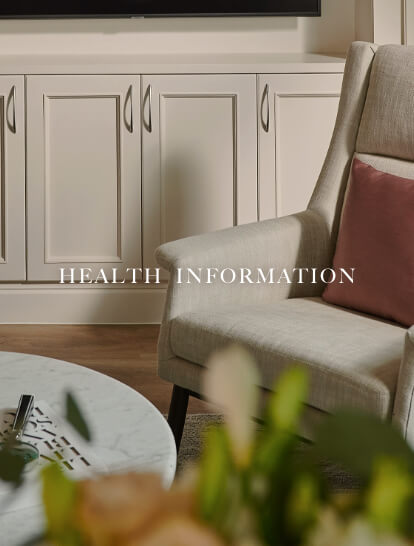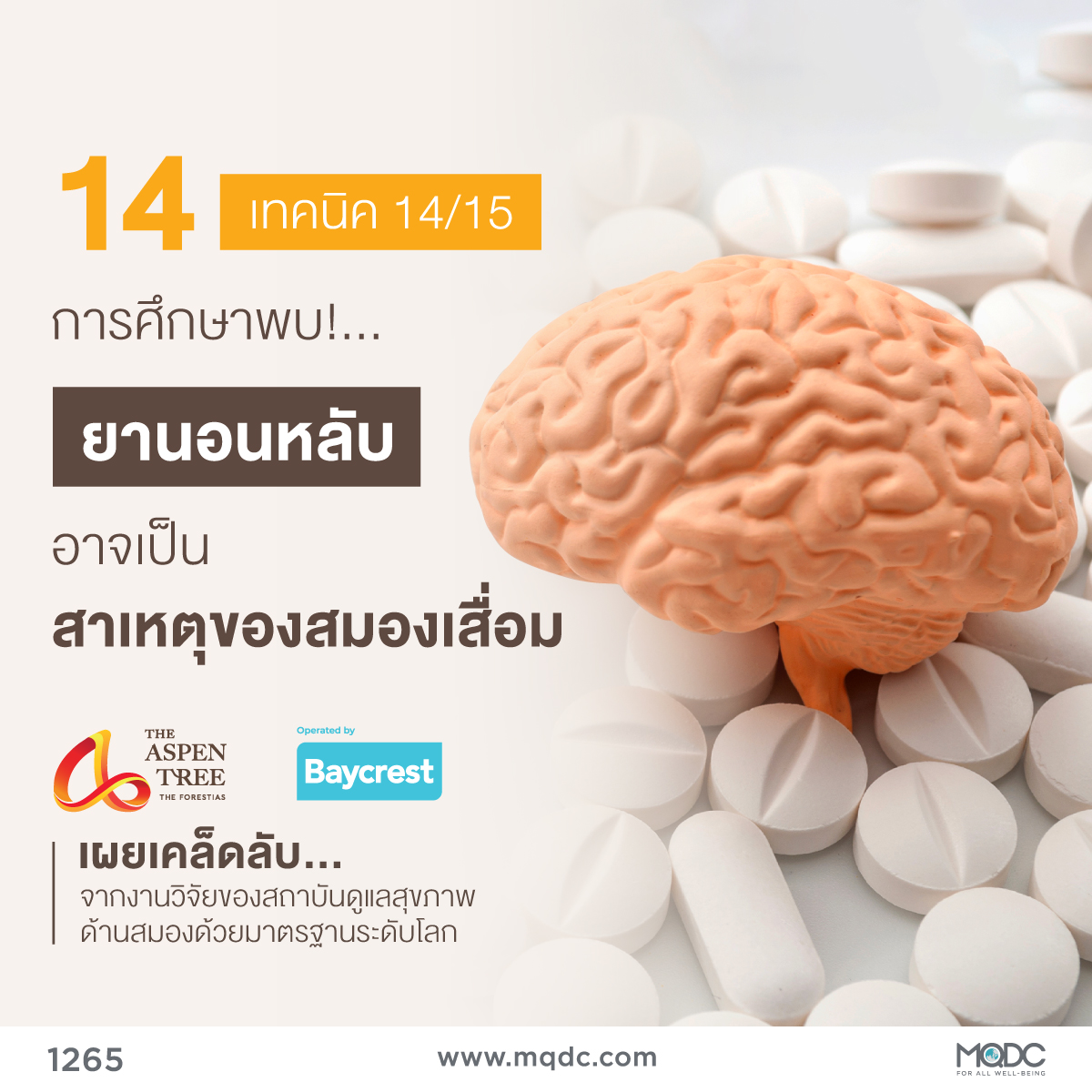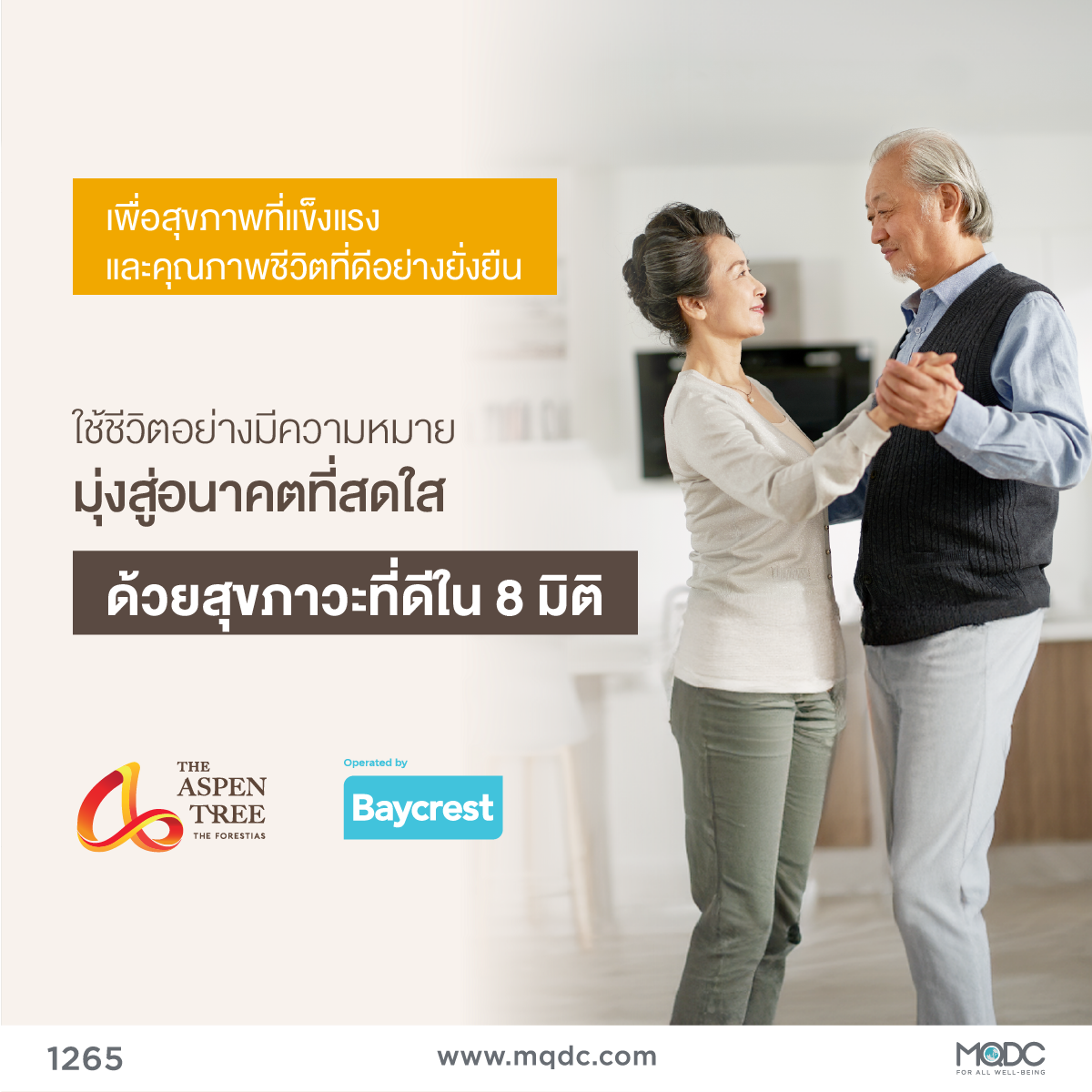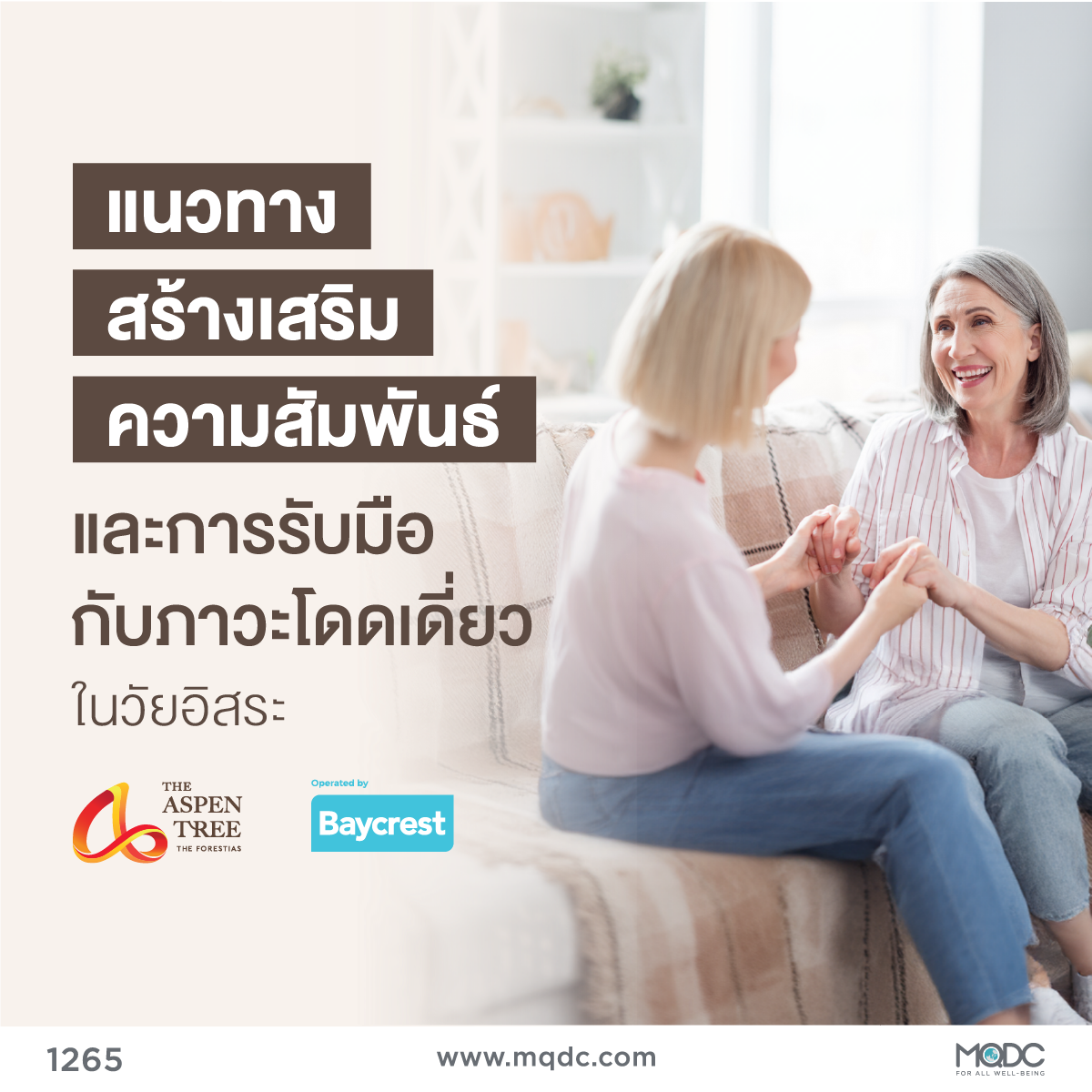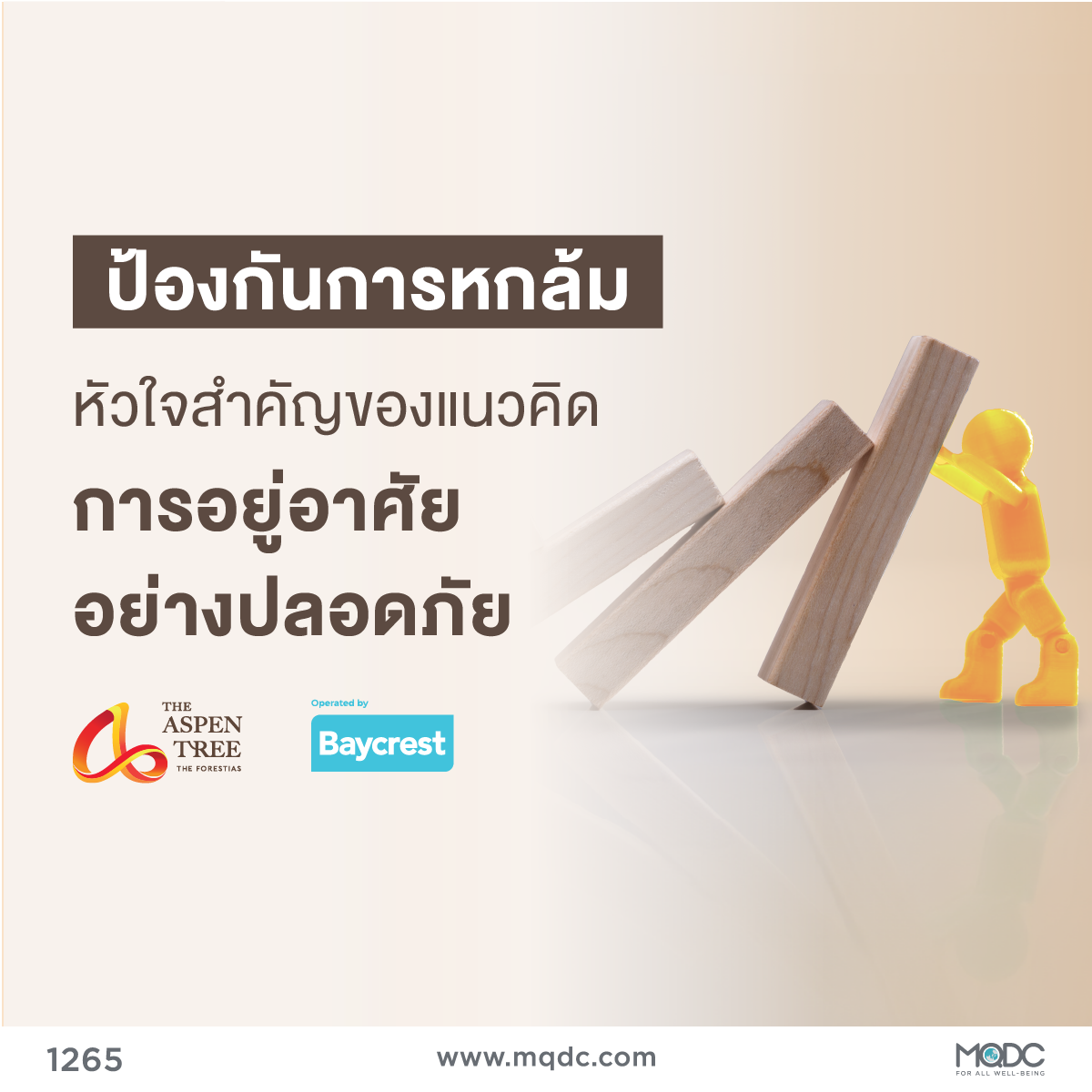Everyone sometimes struggles to sleep. And when you reach 50+, it can be even harder to get a good night's rest. It can be tempting to rely on help like sleeping pills. But studies show sedatives can harm your brain.
Insomnia
Insomnia and finding it tough to fall or stay asleep are common at all ages. The U.S. Department of Disease Control has found that as many as 1 in 3 adults have sleep problems. This issue is more common in people over 65. A Department of Mental Health survey in Thailand in 2013 found that 22% of elderly people experience sleep problems. Symptoms include struggling to fall asleep and waking up in the middle of the night, not sleeping well, waking often.
We shouldn’t ignore sleep problems. Sleep health affects physical and mental health in many ways. Not getting enough sleep not only makes us feel tired the next day. There are also long-term negative effects on the body from chronic insomnia, such as increased risk of high blood pressure, heart disease, kidney disease, diabetes, obesity, stroke.
Sleep problems also affect mental health. People with sleep problems are at higher risk of depression. Toxins are flushed from the brain while we sleep too. So insomnia shouldn’t be allowed to linger. You should see a psychiatrist, especially if you’ve have had insomnia for 2 weeks straight.
Using Sleeping Pills for Insomnia
Medication is a quick fix for insomnia, with results in minutes. So medicines for sleeping are widely used. There are 3 groups:
- Psychotropic drugs that must be prescribed by a doctor, such as
- Benzodiazepines (BZD) including diazepam (Valium®), alprazolam (Xanax®), clonazepam, lorazepam
- Non-benzodiazepines (Non-BZD/Z-drugs) including zolpidem (Ambien®) zopiclone, eszopiclone, zaleplon
- Antidepressants including trazodone
- Over-the-counter medicines including diphenhydramine, chlorpheniramine (CPM), doxylamine
- Supplements that help with sleep including valerian, melatonin
A study on drug use among people with insomnia found that 19% used prescription drugs and 27% used over-the-counter drugs from pharmacies.
Taking sleeping pills is an effective, short-term solution to sleep problems. But they shouldn’t be used for months without a doctor’s supervision. These drugs act on the brain. Long-term use affects brain structure and function. Unwanted side effects include addiction. Resistance creates a need for higher dosage. They also increase the risk of falls and accidents. Above all, though, sleeping pills increase the risk of dementia among the elderly.
Sleeping Pills and Dementia
Sleeping pills and dementia are challenging research subjects that require a long time to study and gather data. Dementia progresses for many years before symptoms appear. Sleep problems can also be an early symptom of dementia in themselves.
So it’s hard to pinpoint how sleeping pills contribute to dementia and how dementia causes insomnia and reliance on sleeping pills. It's a chicken-and-egg problem: which came first?
Research therefore tracks the health of people without dementia for several years until the onset of dementia. A study published in 2020 followed the health data of 6,300 Americans over 65 years of age for 8 years. It found that people who used sleeping pills regularly, every night or almost every night, had a 30% greater risk of dementia later in life.
And another study published in 2023 confirmed these results. The research followed 3,068 elderly people who had not yet been diagnosed with dementia for 15 years. Those who used sleeping pills frequently or almost every night had a 79% higher risk of dementia.
The sleeping pills that most increased the risk of dementia were benzodiazepines. The drugs in this group may interfere with the functioning of neurotransmitters in the learning and memory processes. The 2 studies also found that occasional use of sleeping pills doesn’t affect dementia.
Avoiding Sleeping Pills for Brain Health
The use of sleeping pills, although a simple solution to insomnia, is linked to dementia risks. Sleeping pills should therefore be used carefully, only occasionally as needed. And the medicine should be used under the supervision of a doctor.
Treating insomnia should begin with finding the cause. You should check for sleep apnea by doing a sleep test to assess the cause of sleep problems and look for non-drug treatments such as:
- Cognitive behavioral therapy (CBT)
- Adjusted health behaviors such as regular exercise, sleep hygiene, meditation to relax the mind
If you need medication, start with melatonin because it’s safer than sleeping pills.
Summary
Sleep health is crucial for the body, mind, and brain. Insomnia needs to be cured. But sleeping pills only address the symptoms. Using pills every night for a long time harms the brain, whether through addiction or dementia. People aged 50+ should avoid using sleeping pills often. And you should consult a doctor to find out the cause of insomnia or try a non-drug treatment option.
A Healthy Body, Mind, and Brain Is the Best Gift at 50+ at The Aspen Tree at The Forestias Operated by Baycrest with “Holistic Lifetime Care”
Medical technology now helps us live longer but the most precious gift when we get older is good health to live an independent and meaningful life free from worry. This concept inspires The Aspen Tree at The Forestias.
The residential community is designed and developed with research leaders and world-class eldercare expertise from Canada’s Baycrest center. You live in a multi-generation community at The Forestias green district and enjoy “Holistic Lifetime Care” along with full facilities.
The Health & Wellness program enhances your lifestyle with yoga, swimming, singing, playing music, meditation, outdoor activities, hydrotherapy, and lots more to boost and maintain your physical, mental, and brain health.
The Aspen Tree at The Forestias also has a Health & Brain Center that provides health services to keep your mind and body in top form. A team of health specialists is on call 24 hours a day to give you peace of mind and holistic good health.
Live a carefree life in the carefree time of life. Let's discover the perfect life together.
Find out more CLICK https://mqdc.com/aspentree
Call 1265
LINE OA: @TheAspenTree or click https://mqdc.link/3Emhkde
References
- https://www.ncbi.nlm.nih.gov/pmc/articles/PMC7925354/
- https://www.uclahealth.org/news/questions-remain-about-link-between-sleep-meds-and-dementia#:~:text=A%20study%20published%20in%202020,an%20early%20symptom%20of%20dementia
- https://www.ucsf.edu/news/2023/01/424661/do-sleep-medications-increase-your-chances-dementia
- https://www.thaihealth.or.th/%E0%B8%81%E0%B8%A3%E0%B8%A1%E0%B8%AA%E0%B8%B8%E0%B8%82%E0%B8%A0%E0%B8%B2%E0%B8%9E%E0%B8%88%E0%B8%B4%E0%B8%95%E0%B8%9E%E0%B8%9A%E0%B8%84%E0%B8%99%E0%B9%84%E0%B8%97%E0%B8%A2-%E0%B8%99%E0%B8%AD%E0%B8%99/
- https://www.ninds.nih.gov/health-information/public-education/brain-basics/brain-basics-understanding-sleep
- https://academic.oup.com/sleep/article/39/4/825/2453997
- https://pharmacy.mahidol.ac.th/DIC/news_weekphp?id=1509
- https://content.iospress.com/articles/journal-of-alzheimers-disease/jad221006


